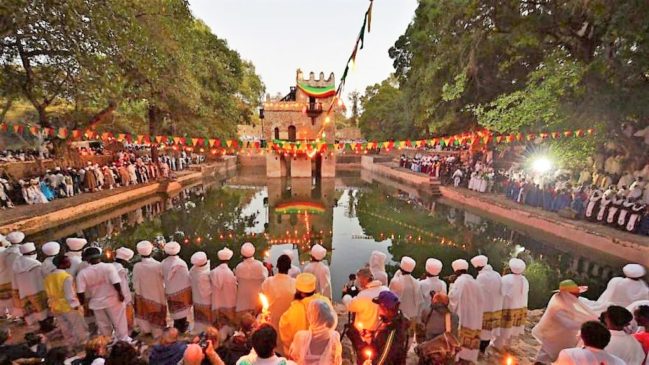Ethiopia to celebrate New Year
 Addis Ababa – Ethiopia, with its own calendar, will be starting its New Year 2010, on Monday, and citizens are busy preparing for celebrations.
Addis Ababa – Ethiopia, with its own calendar, will be starting its New Year 2010, on Monday, and citizens are busy preparing for celebrations.
Ethiopia has its own calendar with 13 months, and each of the 12 months has 30 days, and the 13th month called Pagumen has five days, which becomes six in each leap year.
Ethiopian New Year comes at the time when the heavy rainfall starts to cease, and the bright sun comes to shine over the green land, which is also covered by the golden flower known in Amharic language as “Adey Abeba“.
As it comes with change of the season, the New Year in Ethiopia is celebrated with new hope, and the people are making special preparations.
The celebration of the holiday starts on the eve, whereby each household or neighbors in (group) lit wooden torches locally called “chibo” in Amharic language, which symbolizes the coming of the new season of sunshine after the end of the cloudy (rainy) season that has prevailed since June.
The Ethiopian New Year is accompanied by songs of girls who play, among others, the well-known Amharic song called “Abebayehugn” which literally means “I have seen flowers”, still heralding the end of the rainy season and that the land is covered by the golden flower “Adey Abeba”, which appears in abundance this time. The girls, who are dressed and adorned well, go from house to house and play the song with hand-drum.
Boys, mainly in urban areas, go from house to house to present pictures, painted by themselves, of angles or famous figures in the world, saying “Happy New Year.” It has been the custom here that when the girls come to sing the New Year song, and the boys to present the New Year gift (paintings), heads of households will provide little amount of money as gift.
At household level, families purchase chicken, sheep, goats, and oxen while preparing special bread locally called “Diffo” in Amharic language, as well as drinks of house-made beer, “Tella”, and a honey-wine “Tejj”. The coffee ceremony, though it is held at ordinary times at household level, is now conducted differently and colorfully.
On the main day, when the New Year starts, families sit together around tables to enjoy the special dishes prepared for the feast; relatives and neighbors visit each other and exchange special greetings of the season, and dine together.
On the eve, Xinhua journalists went out to some sheep and chicken markets here in Addis Ababa, capital of Ethiopia, to see how the markets were going on, and the preparations for the holiday.
At chicken market, Zertihun Fasika, a woman who was there to purchase a live chicken, said she was purchasing items including hen for the holiday. She said she was preparing for the New Year to celebrate it with her child.
“The preparation for the holiday is good. I am going to celebrate it with my child happily. I have bought this (hen) with 170 Birr (7 U.S. dollars). It’s good. I wish happy, prosperous, and peaceful year,” said Zertihun.
At a chicken market, Mezgebu Mamo, a man who was selling live chicken, told Xinhua that he was selling hens with big discount.
“I am here selling the hens which I have brought here. The price is good here, cheaper than that of some of others. I am selling them with big discount,” he said.
It is a custom here in Ethiopia that people slaughter sheep, goats, and oxen at household level. For the oxen, they share it in group, and locally called “Qircha” in Amharic language.
Asfaw Shumye was at one of the sheep markets in the city, and he told Xinhua, “Relatively, the price of sheep is expensive now. I want to buy it as per my pocket capacity. I have eight children, and it is our custom to buy sheep on this day. I wish a happy, prosperous, and peaceful year to all Ethiopians.”
Ethiopia has organized events at national level for 10 consecutive days launched on September 1 to welcome the New Year.
Source: Xinhua



